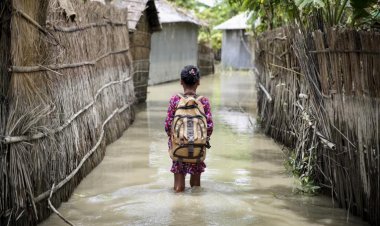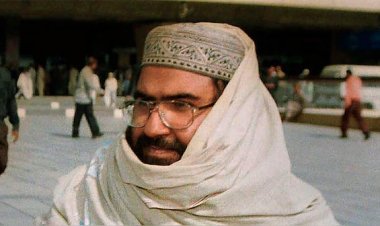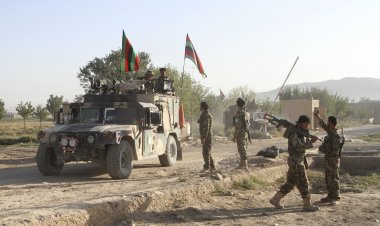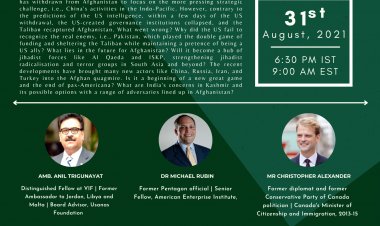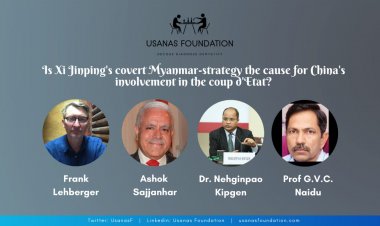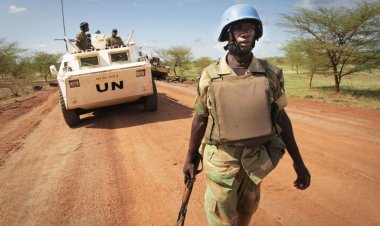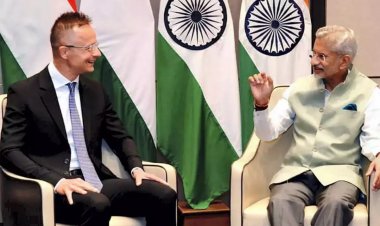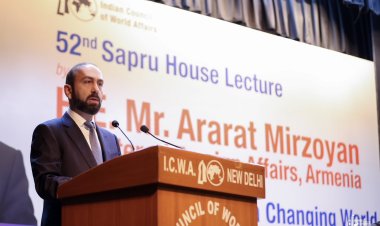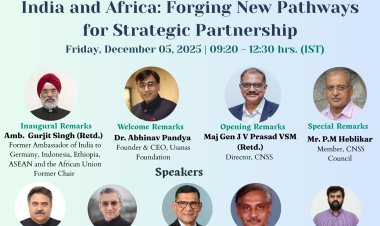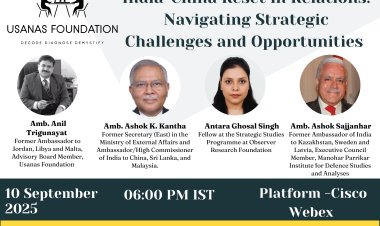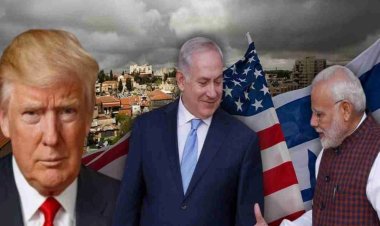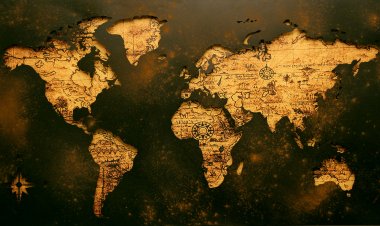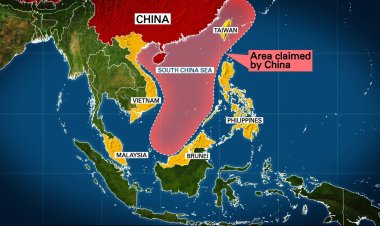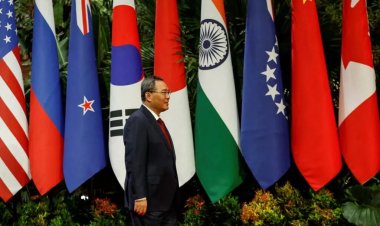Pakistan’s Future: Geopolitical Dilemmas, Economic Woes and Troubling Fault Lines
Pakistan today faces the geopolitical challenge of balancing between the US and China and choosing between Turkey and the Arab world, besides suffering from internal fault lines like the Pashtun, Baloch, and Sindhi movements amidst a highly radicalized society.
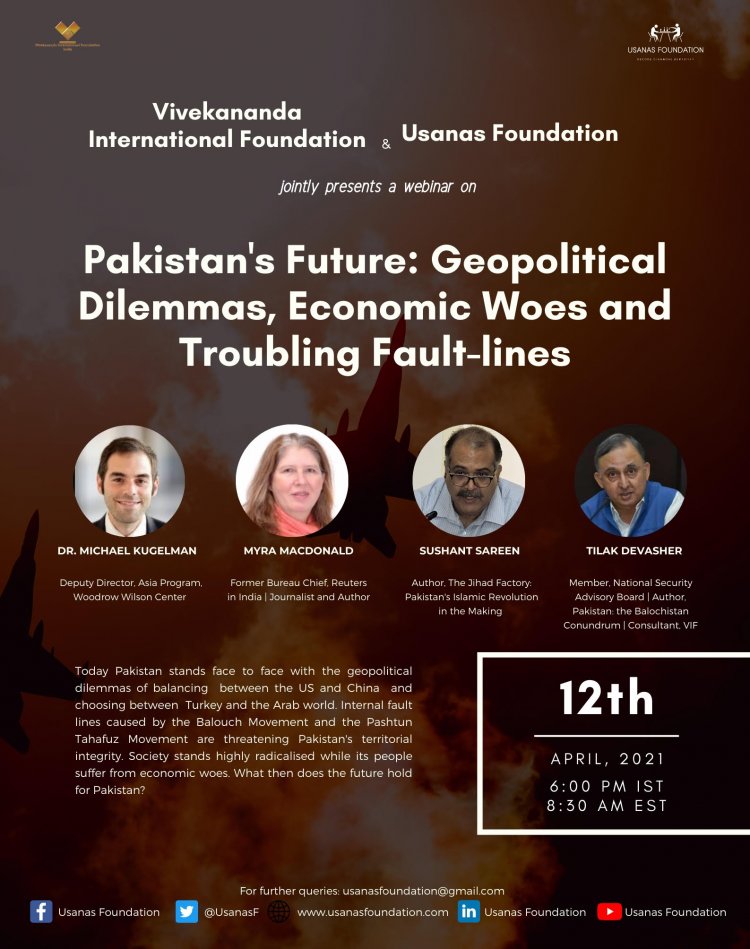
Webinar Report
Main Takeaways:
- Pakistan's obsession with the Kashmir proxy war and support for the rogue Taliban regime will continue and hence it seems unlikely that Islamabad will shift its focus towards Geo-economics despite making lofty claims in the Islamabad Security Summit.
- On the diplomatic front, Pakistan's strengthening friendship with China, Russia, Iran and Turkey will not go down well with the Arabs and Other Muslim World.
- Internally, pressing economic issues and troubling separatist tendencies will continue to threaten Pakistan's territorial integrity.
- Pakistan's other problem arises from its growing centrality of Kashmir on its foreign policy but the end of Kashmir's special status has brought a sea-change in Kashmir's quantum dynamics. Pakistan-supported terrorist infrastructure is dying a slow death. However, Pakistan cannot do much about it except for raising the issue in the International forum.
- With Pakistan's support, the Taliban is likely to come back to Afghanistan. However, it will further deteriorate the situation in Afghanistan, adversely affecting the regional and global geopolitics and Pakistan, in turn, will also suffer.
Pakistan today faces the geopolitical challenge of balancing between the US and China and choosing between Turkey and the Arab world, besides suffering from internal fault lines like the Pashtun, Baloch, and Sindhi movements amidst a highly radicalized society. To discuss the future of Pakistan and its impact on geopolitical dynamics, Usanas Foundation and Vivekananda International Foundation (VIF) jointly organized an in-house webinar on "Pakistan's Future: Geopolitical Dilemmas, Economic Woes and Troubling Fault Lines" on 12th April 2021.
The speakers in the event were Deputy Director of Asia Program at Woodrow Wilson Centre, Michael Kugelman; Former Bureau Chief of Reuters and Pakistan expert Myra MacDonald; geopolitical expert Sushant Sareen; member of the National Security Advisory Board and VIF Consultant, Tilak Devasher; and the Director of Vivekananda International Foundation, Arvind Gupta.
In his opening remarks, Mr. Arvind Gupta remarked that we have all been concerned about Pakistan for several decades. Pakistan is a troubled state, and its geo-strategic location makes it troublesome for the region and the globe. Afghanistan and its relations with India are also a factor in this. During the recent Islamabad Security Dialogue, the speeches suggested that there is a possibility for new thinking evident in Pakistan’s policymakers. But in Pakistan's deep state, they are talking about how it needs to leverage its geo-strategic location and improve its relations with its neighbors and bury past hatchets. These ideas are good, but it is yet to be seen if Pakistan can actually change. There are new alignments in the region as Russian Foreign Minister Sergey Lavrov recently visited Pakistan and the China-Pakistan Economic Corridor also continues to pose a conundrum. Pakistan’s talks with Turkey and Iran have also prompted talks of a new nexus. The Kashmir issue remains in the DNA of Pakistan and therefore it remains to be seen if Pakistan can turn over a new leaf.
The first panelist at the webinar, Michael Kugelman said that Pakistan's future will be a lot like its present, in both – domestic and the international sphere. Domestically, Pakistan is suffering from the same problems that it was suffering from decades ago and these problems are so deeply entrenched that it is unreasonable to believe that they will go away anytime soon. These problems are only going to get worse. Let's take the example of the economy which is severely struggling under the weight of inflation and austerity necessitated by the next IMF package. These problems are created by long-standing problems such as a low tax base, heavy reliance on non-competitive textile exports, and inability to capitalize on a large young population due to lack of education and vocational training.
There will also be more challenges in the future, such as a lack of natural resources like water. Pakistan is already water insecure and climate change will only exasperate the situation and the country is also running out of indigenous energy supplies, even with the leeway brought by Chinese investments. Pakistan is a country that provides an environment that gives rise to extremism, from school textbooks to speeches of religious figures, extremism is everywhere evident. Pakistan also has deep class divides. Like the economy, Pakistan's society is likely to face major challenges in the coming months and years. Water and energy shortages in the agriculture sector will prompt more rural to urban migration and lead to greater urbanization.
Another reason to be worried about Pakistan's future is that even the most recent positive developments in the past few years are under strain. For example, the improving security situation – terrorist violence in the region has gone down but the investment climate in the country still suffers from problems that prevent Pakistan from capitalizing on its better security situation. Pakistan's tech sector is a success story, but the Army is cracking down hard on the internet and virtual sphere as a part of an ongoing attempt to cut the liberal sphere down to size and eliminate any forms of dissent. Pakistan's decentralization reforms have been one of its democratic success stories, but the current government has tried to concentrate more power into its hands and claiming that giving out power to the provinces makes it harder for the country to deal with large-scale challenges like the pandemic.
As far as external challenges are concerned, to Islamabad's credit, some of the statements that Pakistan has made about burying the hatchet of the past and other proclamations have not just been for show. It has made commitments to regional connectivity projects and even new agreements with Afghanistan and Central Asian states. For a lot of the projects that Pakistan is venturing into with Afghanistan, there has to be peace in Afghanistan and at this time, it is believed that there is no reason for Pakistan to oppose the current peace process in Afghanistan. Even with these improvements, Pakistan is in no place to become the locus of geo-economic activity. In the coming months, Pakistan may seek to deepen its existing partnerships as well as diversify them with partners. Beyond this, there will only be more of the same. Pakistan will continue to peruse the Kashmir issue in international forums. The army will continue to cause friction with India because if it seeks out peace with India, it will no longer be able to justify its role and authority. In recent months, the military has been exercising more control over the country’s economic policy and shows no intention of returning to the barracks.
Myra MacDonald, the second panelist at the webinar remarked that Pakistan is a failing state, but it never seems to fail, nor does it succeed. Pakistan's economy currently only benefits the military and civilian elites, and as long as that continues, they have no incentive to change the status quo. How can the status quo be changed? With democracy? But Pakistan has moved backward in terms of democracy, and economic progress. The lower-middle cases demand a greater share of power. The general tendency has been to increasingly centralize the power. However, in Pakistan, Islam is not only used to force power but also to contest power and thus the lower middle classes will use Islam to contest the dominance of the civilian and military elites.
In foreign policy, most likely there is not going to be any change. Pakistan does not want a Taliban resurgence in Afghanistan, nor does it want a full-scale civil war as both will be harmful to Pakistan. Instead, it tries to find a middle ground. Finally, the main change in Kashmir has been the bifurcation of Jammu and Kashmir and the removal of Article 370. Successful Pakistan in the future would mean that it would be able to balance China and the US. They would also be able to manage reasonable relations with both.
The next panelist was Sushant Sareen. He said, "All the problems that exist in Pakistan today have existed for seven decades and are only getting worse. Every time there is a glimmer of hope, it does not take long for it to be dashed." For example, democracy and military intrusiveness. The Pakistani military today is more intrusive into the country’s politics than it was during martial law.
There is chronic political instability in Pakistan. The moment a government in Pakistan comes to power, people begin to pull it down. This is not a normal level of opposition that occurs in other countries. Given the political instability in the country, it is reasonable to assume that the government will undertake serious reforms, but Pakistan does not have the political brain to undertake these reforms. Imran Khan is a one-trick pony; he has made himself out to be a crusader against corruption, but corruption has always happened in Pakistan and his focus on corruption is very selective.
Pakistan requires dire reforms in the economy of the country. Some of the reforms are being forced upon Pakistan by the IMF. If Pakistan undergoes IMF reforms, then there will be massive pains that the people will have to suffer, and if they don't go forward with the reforms, then the economic slide continues. It is very clear from the numbers that Pakistan is entering into a debt trap situation. The majority of the debt is not being used for infrastructure projects but used to meet the daily needs of the government and that is unsustainable. According to recently revealed numbers, the Chinese have given Pakistan 10-11 billion to allow it to continue functioning. But the main question is – how much more will China be willing to give Pakistan? Despite the reduction in terrorist violence, there has not been a reduction in radicalization. Instead, it has increased. Radical groups within Pakistan are ignored or actively encouraged because the civilian and military elites believe they have something to gain from it. Radicalization will therefore continue to be a problem in Pakistan.
The military and Imran Khan are no longer on the same page. Going forward, the military elites might try to sabotage any initiatives Pakistan tries to have with India, and even civilians elites with their agendas may try to sabotage it. One of the most troublesome aspects is the misconception that India and Pakistan hold about the intentions of the other side as the reasons for their respective actions.
Pakistan hopes that CPEC will be their outlet to the world and will allow them to prosper. But the fact remains that China already has multiple outlets to the rest of the world and establishing a link to central Asia will not drastically change the country's fortunes. There are multiple other access routes to central Asia indicating that CPEC may not even be used by other nations.
Tilak Devasher, the fourth panelist at the webinar highlighted that the greatest hurdle facing Pakistan currently is the changing of its national goals from geopolitical contestation to geo-economic integration and showing to the world that it is a useful member of the international society and a peace-loving nation. The main question remains – whether the high-sounding words used during the Islamabad Security Dialogue will be followed through and will Pakistan enact those changes? If Pakistan manages to follow through with its proposed ideals, then it will have taken the first step towards reorienting itself from a security state to a developing state. Imran Khan has recently outlined several economic challenges as well as climate-related challenges. If Pakistan does follow through with tackling these problems, then it will represent a significant shift in the country’s policies. Any changes that it is likely to make will thus reflect in the forthcoming budget wherein Pakistan will have to allocate resources accordingly to tackle these non-traditional security challenges.
Pakistan has, however, faltered in the very first steps. The flip-flops in terms of opening up trade with India of commodities that Pakistan requires, such as cotton and sugar, are indicative of this. The gradual resuming of trade ties between the two countries is still looked upon favorably and considered to be indicative of a better understanding between the two countries.
For Pakistan to make the transition from geo-politics to geo-economic considerations is going to be an uphill task. Only time will tell if the leaders in Pakistan, both civil and military, will have the resolve, stamina, and patience to take the country away from geopolitics to geoeconomics and reform the country. At the moment, this seems doubtful.
The US administration cold-shouldering Pakistan in the climate change matters seems to be the Biden administration's way of putting Pakistan on notice for cozying up to China. If China succeeds to invest billions into Iran over the next 25 years as has been promised, then the geopolitics of the region might shift and its impact on Pakistan remains uncertain.
Pakistan has a serious problem in the agriculture sector. Cotton output has been the lowest in several decades. The IMF forecast has predicted a weak growth rate of 1.5% for Pakistan coupled with a higher rate of inflation and rising unemployment. These projections of the IMF are in line with those made by the World Bank. There is also a serious issue of governance. Imran Khan has changed three finance ministers, 6 chairmen of the federal board of revenue, 4 chairmen of the board of investment, and 3 finance secretaries.
Pakistan is also facing the risk of being put on the FATF Blacklist if it is unable to stop terrorist funding. Inflation in Pakistan is also a major issue as according to sources, 80% of Pakistan’s families spend a majority of their income on food. The prices of wheat have shot up manifold in Pakistan in the past two years. Additionally, the average consumer is spending Rs. 66,000 more for electricity than he was 2 years ago. A decade ago, Pakistan faced emergencies in terms of water, electricity, and education. Today, these problems have only grown to the level of disasters. Pakistan uses 95% of its water resources to run one of the world's most inefficient irrigation networks leading to a severe shortage of water. Within the next decade, if Pakistan does not focus its attention on water, it will become a water-scarce nation. In the sector of education, 50% of Pakistan’s children do not attend primary schools and for those that do, there are massive dropouts. The percentage of dropouts increases in higher standards. What this means is that in an increasingly technological world, Pakistan is setting itself up for failure.
A focus on geo-economics is the only way forward for Pakistan. But it remains to be seen if the leadership in Pakistan has it in them to stay the course of changes in the country.
In his concluding remarks, Mr. Arvind Gupta pressed on all the important questions addressed in the discussion, summing up the discussion on how the Geopolitical dilemmas between the US, China, and Turkey and Saudi Arabia, economic woes of the people, and deep-rooted internal fault lines will determine what will Pakistan look like in the foreseeable future.
Mr. Abhinav Pandya closed the webinar by complimenting and thanking all the esteemed speakers and experts for their valuable insights, guests as well as the audience for their participation.
Disclaimer: All opinions expressed in the Webinar belong to the speakers and are not reflective of Usanas Foundation.

